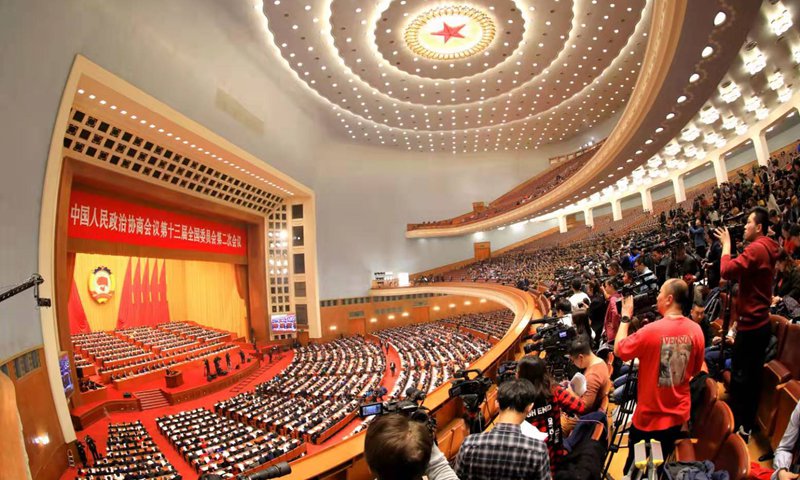Africa may learn from China’s political path to revitalize its own development plans
By Mark Kapchanga Source:Global Times Published: 2020/5/25 19:53:40

The 13th Chinese People's Political Consultative Conference (CPPCC) National Committee kicks off its annual meeting on Sunday at the Great Hall of the People in Beijing, marking the start of this year's two sessions - the annual meetings of the CPPCC and the National People's Congress, China's top legislature - the most important annual political event in China. Photo: VCG
A powerful democratization wave swept across Africa from the late 1980s to early 1990s, resulting in the birth of very much sought-after multiparty politics on the continent.
Effectively, it brought an end to single-party frameworks, blamed for weak governance and slow paces in development that had been in force since independence of many countries.
Pushed principally by the West, the introduction of multiparty politics promised Africans a new world order of wealth creation, universal and affordable healthcare, food security, better education, and improved infrastructure.
Approaching a third decade now since this new political model was welcomed with ululation, the ambitious pledges have been revised, postponed and at times, called off, as most African countries grapple with a proliferation of political parties that lack robust missions, issues, ideologies, and policies.
Moreover, the outfits remain deficient in structures, programs as well as internal management practices. This has in turn hurt democratic consolidation, and, in turn, impeded desired economic growth. Such are the challenges that have left Africa fixated to external assistance.
As times goes by, the situation has turned out not to be any better. Unlike other regions, Africa currently seems to be leaning toward the formation of political parties that are based on their ethnic backgrounds to attain electoral majority.
Strikingly, in circumstances where the requisite threshold has not been attained, coalitions have been formed. So far, this rare phenomenon has been witnessed in Kenya, Malawi, Mauritius, and South Africa. However, it remains to be seen whether the building of coalitions as governing model can bear out long-term development prospects in Africa.
Be that as it may, what is emerging is that multiparty politics cannot guarantee the development in Africa. Instead, it has become an instrument that marginalizes the poor and minorities, breeding ethnic, sometimes racial, and religious divisions. In fact, most political parties are formed to win elections and make short-term gains.
Given the competitive nature of political systems, elections have become the trigger of division, the destruction of lives and properties, and violence in Africa.
Yet, this is not supposed to be the case. Political parties are expected to be prime actors in the democratization and development of Africa, ordinarily mediating between society and the state.
Given the much work and progress that the continent yearns for, political parties would be expected to provide enduring ideologies that represent social and economic interests of the people and churn out leaders who will play a principal function in coming up with policies and projects that will turn around the continent's fortunes.
This said, there is an urgent case for an improved performance of political parties in Africa in terms of their acknowledging that they are the primary determinants of the long term development of the continent.
The same way the world is keenly following the Chinese economic model that is underpinned by its solid political system, perhaps it is time, too, that Africa learns from China's political path to revitalize its own development plans.
With a prioritization of science as the source of pragmatic knowledge, China's policy of reform and opening-up adopted in 1978 has not only ushered in remarkable transformation but has also led to poverty alleviation, boosted ex-ports and enhanced foreign investment.
Simplistic as it may sound, China's spectacular socioeconomic reforms have been a product of resilience and corresponding political policies and commitment.
In fact, this political dedication in the country's welfare was evident on Friday when Premier Li Keqiang, while opening third session of the 13th National People's Congress (NPC) at the Great Hall of the People in Beijing, stated the impressive work the Chinese central government has done in countering COVID-19 under the leadership of the Communist Party of China (CPC).
Besides this achievement in its response to COVID-19, the NPC heard of China's economic milestones set in the past year, and the main targets ahead in the country's bid to boost living standards, increase employment, and alleviate poverty.
As stated in the past by President Paul Kagame of Rwanda - a country that has guarded its political stability since 1994 and sustained its economic growth rates over the last decade - the West should not fix its political models on Africa. Instead, the continent should have its own models that are informed by its development needs.
There is no doubt that the populist multiparty format has failed in the continent. It has not yielded the much-desired outcomes. It is high time that leaders of Africa revisited their political constructions, and formulate one that is underpinned by ideologies and development-oriented policies, like the CPC does.
Such a move would not only pave way for strong political parties with clearly outlined missions and programs, but also present to African countries a unique opportunity to pursue their own development agendas that addresses their own needs.
The author is a researcher and expert on China-Africa cooperation based in Nairobi, Kenya. Follow him on Twitter @kapchanga. opinion@globaltimes.com.cn
Posted in: VIEWPOINT